Places where Prayer is not Permissible
By the Esteemed Scholar
Muhammad Nasir uddeen Al-Albaani
May Allaah have mercy on him.
Translated
By
Abbas Abu Yahya
It is not permissible to pray in ten places:
1. The graveyard, it is the site where people [even if it is a single person] are buried.
) ﻟﻌﻨﺔ ﷲ ﻋﻠﻰ اﻟﯿﮭﻮد واﻟﻨﺼﺎرى اﺗﺨﺬوا ﻗﺒﻮر أﻧﺒﯿﺎﺋﮭﻢ ﻣﺴﺎﺟﺪ (
“May Allaah curse the Jews and the Christians; they took the graves
of their Prophets as places of worship”
Collected by Al-Bukhari & Muslim.
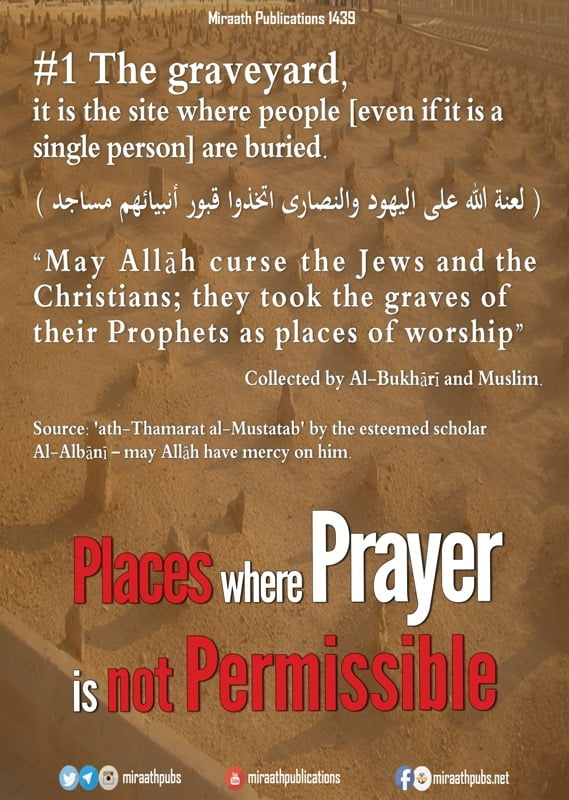
2. The Masajid that are built upon graves.
إن أوﻟﺌﻚ إذا ﻛﺎن ﻓﯿﮭﻢ اﻟﺮﺟﻞ اﻟﺼﺎﻟﺢ ﻓﻤﺎت ﺑﻨﻮا ﻋﻠﻰ ﻗﺒﺮه ﻣﺴﺠﺪا وﺻﻮروا ﻓﯿﮫ ﺗﻠﻚ اﻟﺼﻮر ﻓﺄوﻟﺌﻚ ﺷﺮار (
) اﻟﺨﻠﻖ ﻋﻨﺪ ﷲ ﯾﻮم اﻟﻘﯿﺎﻣﺔ
“If there were amongst them a righteous man who died, they would build a Masjid on his grave. They would create those portraits [of their dead] in it. Those people are the worst of Creation before Allash on the Day of Judgement.”
Collected by Al-Bukhari & Muslim.
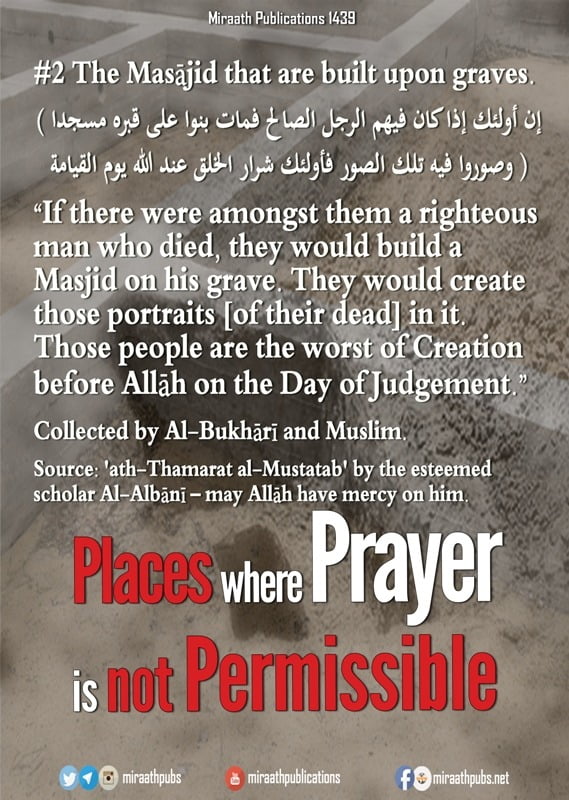
3. The watering places of camels and the places where they kneel down.
ﺻﻠﻮا ﻓﻲ ﻣﺮاﺑﺾ اﻟﻐﻨﻢ وﻻ ﺗﺼﻠﻮا ﻓﻲ أﻋﻄﺎن اﻹﺑﻞ
“Pray in the sheep pens and do not pray in the watering areas of
camels.”
– and it is the wording of Imam Aḥmad.
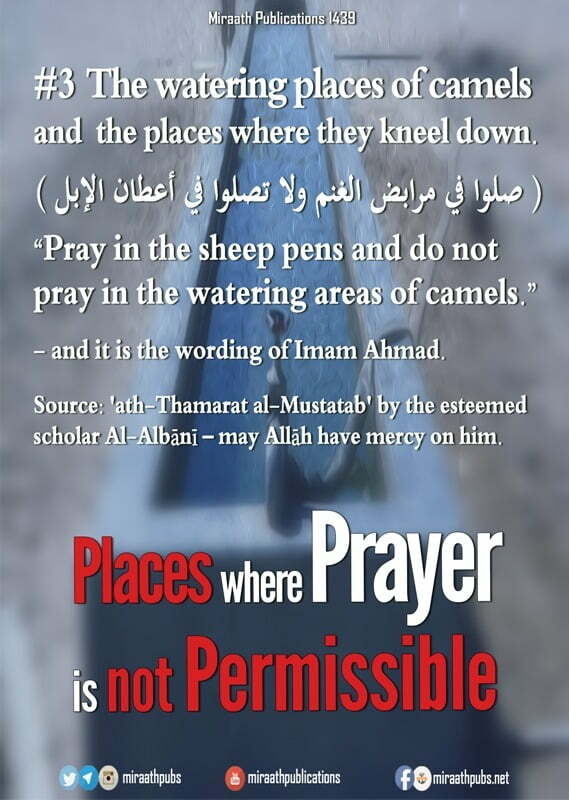
4. The bathroom.
)اﻷرض ﻛﻠﮭﺎ ﻣﺴﺠﺪ إﻻ اﻟﻤﻘﺒﺮة واﻟﺤﻤﺎم (
“All of the earth is a Masjid except for graveyards and bathrooms.”
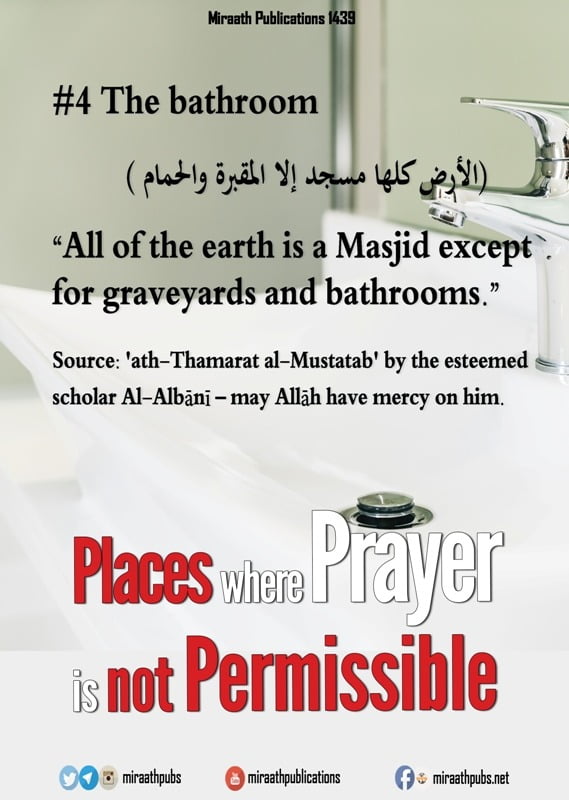
5. Every place that the devils take shelter in, such as the places of sin and immorality. . .
like the churches and synagogues, due to the ḥadeeth of Abu Hurayrah, may Allaah be pleased with him, who said:
“We went to sleep late at night with the Prophet, may the praise and blessings of Allāh be upon him, and we did not wake up until the sun had risen. So the Prophet said,
)ﻟﯿﺄﺧﺬ ﻛﻞ رﺟﻞ ﺑﺮأس رﺣﻠﺘﮫ ﻓﺈن ھﺬا ﻣﻨﺰل ﺣﻀﺮﻧﺎ ﻓﯿﮫ اﻟﺸﯿﻄﺎن ﻓﻠﻢ ﯾﺼﻞ ﻓﯿﮫ (
‘Let every man proceed on his journey for verily the Shaytaan inhabits this place that we have arrived in, so he [i.e. any of the men] should not pray in it [i.e. this place].’”
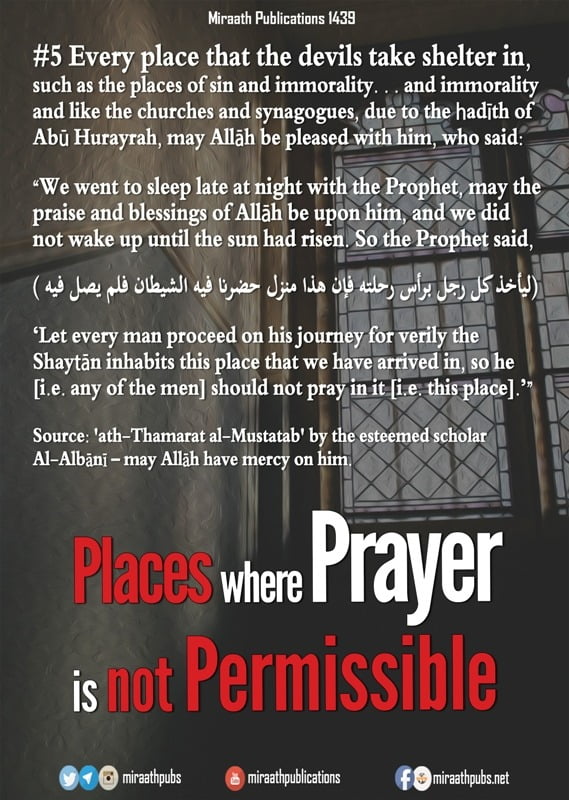
6. Land seized unlawfully, and that is due to the prayer on land seized unlawfully being haram by consensus as was mentioned by Imam An-Nawawi.
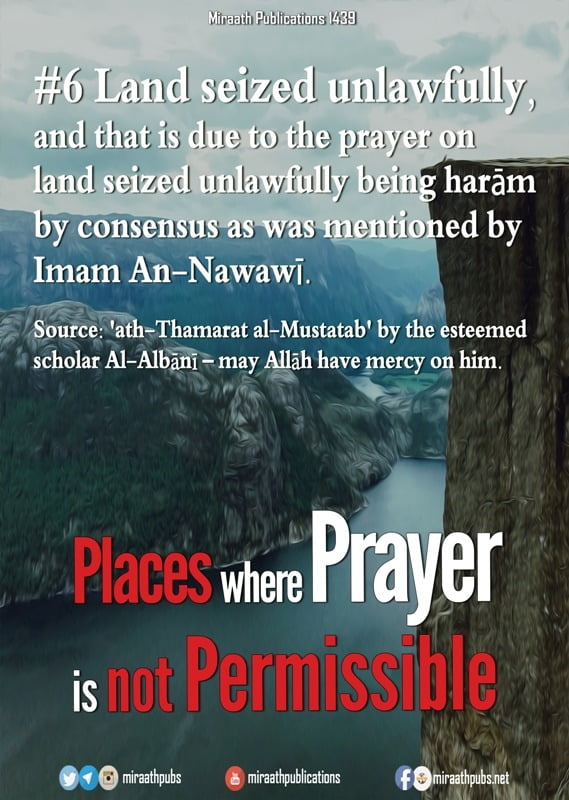
7. The Masjid Dirar that is in close proximity to [Masjid] Quba’ and all the Masajid that are built for [the purpose of] harming and causing disunity amongst the Muslims due to the saying of Allāh,
} واﻟﺬﯾﻦ اﺗﺨﺬوا ﻣﺴﺠﺪا ﺿﺮارا وﻛﻔﺮا وﺗﻔﺮﯾﻘﺎ ﺑﯿﻦ اﻟﻤﺆﻣﻨﯿﻦ وإرﺻﺎدا ﻟﻤﻦ ﺣﺎرب ﷲ ورﺳﻮﻟﮫ ﻣﻦ ﻗﺒﻞ {
《“And [there are] those [hypocrites] who took for themselves a Masjid for causing harm and disbelief and division among the believers and as a station for whoever had warred against Allaah and His Messenger before.”》
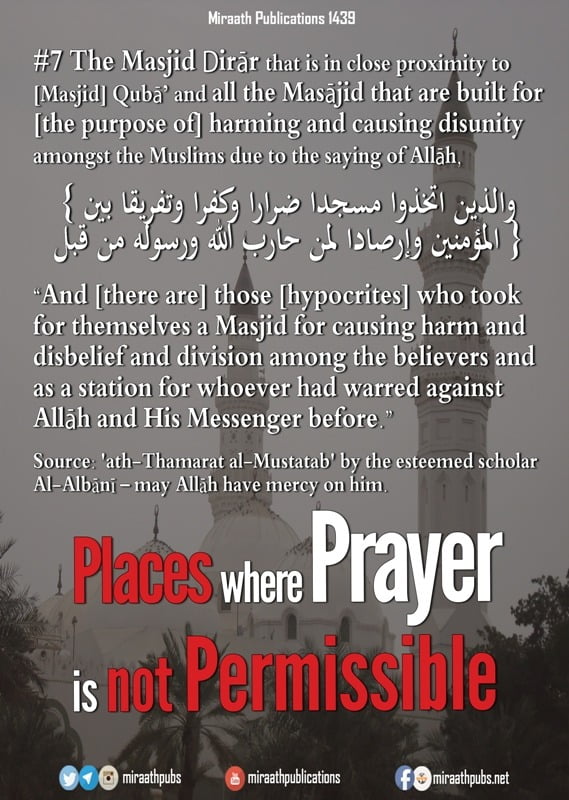
8. Places of humiliation [where people were swallowed into the earth] and punishment, for indeed it is not permissible to enter into them categorically except [in a state of] weeping and fear of Allāh, due to the saying of [the Prophet] upon whom be the praise and blessings [of Allāh], [when he passed by [the place of the people of] Al-Ḥijr].
ﻻ ﺗﺪﺧﻠﻮا اﻟﺒﯿﻮت ﻋﻠﻰ ھﺆﻻء اﻟﻘﻮم اﻟﺬي ﻋﺬﺑﻮا] أﺻﺤﺎب اﻟﺤﺠﺮ [ إﻻ أن ﺗﻜﻮﻧﻮا ﺑﺎﻛﯿﻦ ﻓﺈن ﻟﻢ ﺗﻜﻮﻧﻮا ﺑﺎﻛﯿﻦ (
) ﻓﻼ ﺗﺪﺧﻠﻮا ﻋﻠﯿﮭﻢ ﻓﺈﻧﻲ أﺧﺎف أن ﯾﺼﯿﺒﻜﻢ ﻣﺜﻞ ﻣﺎ أﺻﺎﺑﮭﻢ
“Do not enter the houses of these people who were punished [the people of Al-Ḥijr] except that you are weeping, and if you are not weeping then do not enter upon them. For verily, I fear that you will be afflicted with what afflicted them.” Then the Messenger of Allaah covered his head [with his robe whilst he was on his ride] and he hastened his journey until he had passed the valley.
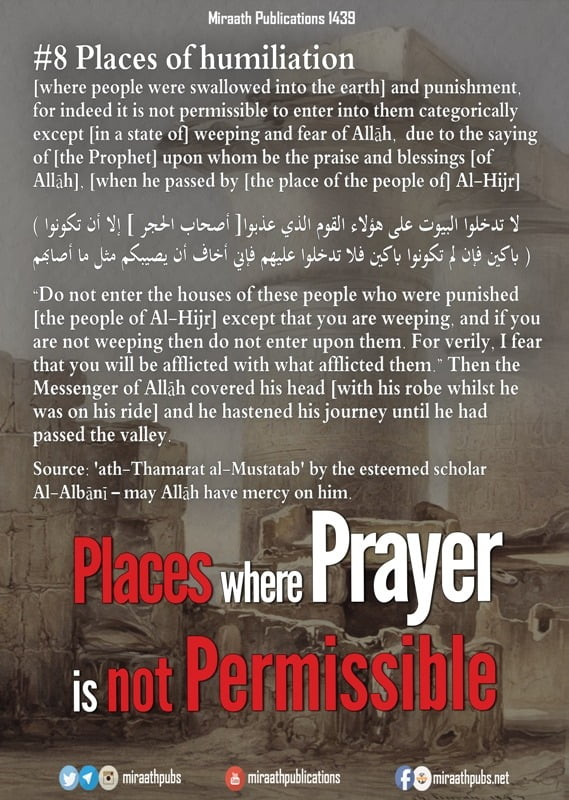
9. The elevated place on which the Imam stands, [making him] higher than [the place of] the followers [in prayer].
ﻧﮭﻰ رﺳﻮل ﷲ أن ﯾﻘﻮم اﻹﻣﺎم ﻓﻮق ﺷﻲء واﻟﻨﺎس ﺧلفه – ﯾﻌﻨﻲ : أﺳﻔﻞ ﻣنه
“The Messenger of Allaah, may the praise and blessings of Allaah be upon him, forbade that the Imam should stand on top of something whilst the people are [praying] behind him i.e. [they are] lower than him.”
Collected by Al-Dāruquṭnī and extracted by Al-Ḥākim.

10. The place between pillars where the people following in prayer line up.
“We prayed behind one of the leaders and the people compelled us so we prayed between two pillars. So Anas Bin Mālik began to delay [in joining us]. When we had prayed Anas said,
ﻛﻨﺎ ﻧﺘﻘﻲ ھﺬا ﻋﻠﻰ ﻋﮭﺪ رﺳﻮل ﷲ
‘We used to keep away from this in the era of the Messenger of
Allaah.’”
The ḥadeeth was extracted by Abū Dāwūd and Al-Nasā’ī and Al- Tirmidhī and Al-Ḥākim and Aḥmad in his musnad.
Document source: ‘ath-Thamarat al-Mustatab’ by the esteemed scholar Al-Albaani – may Allaah have mercy on him.
Translated for Miraath Publications in 1438 A.H.